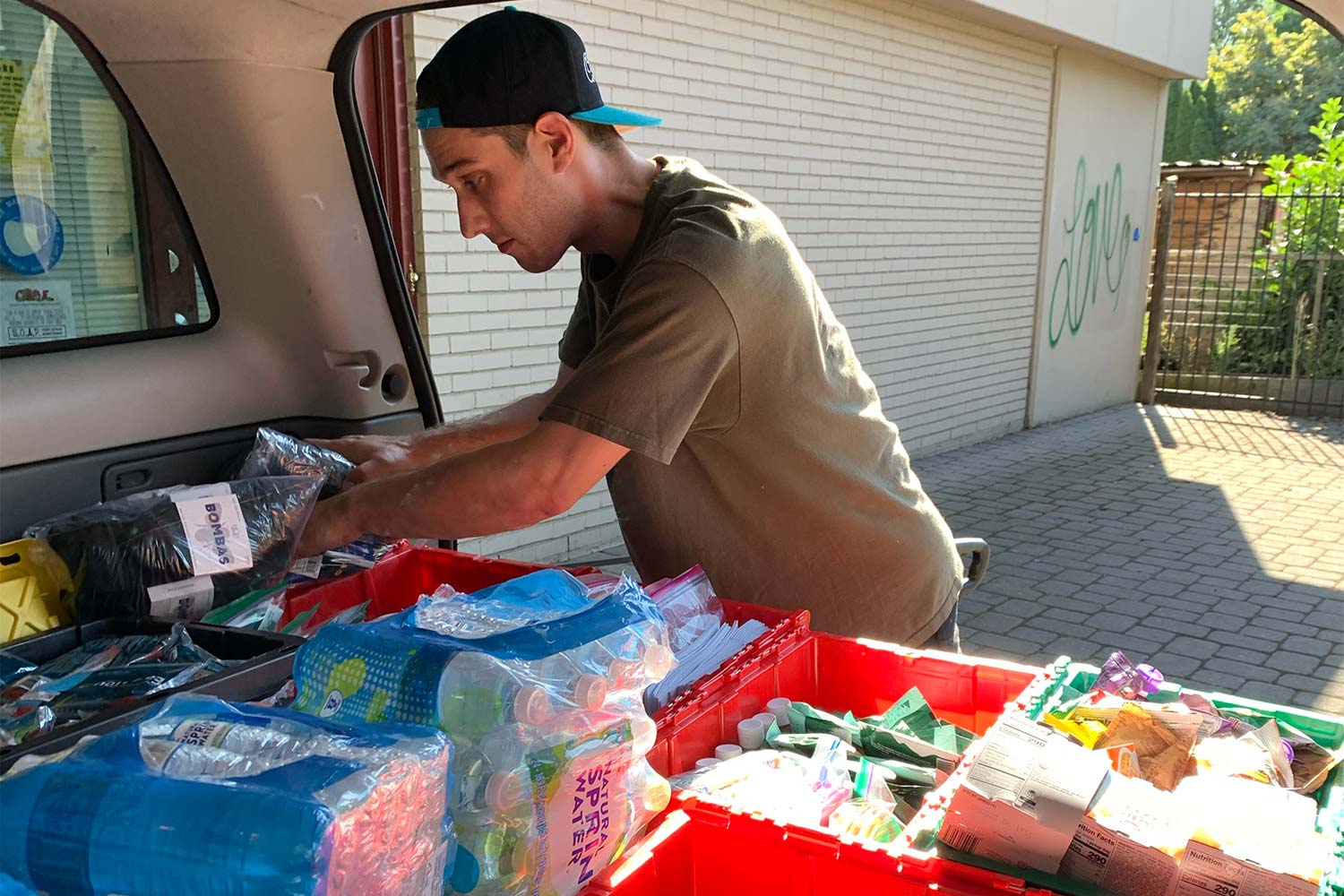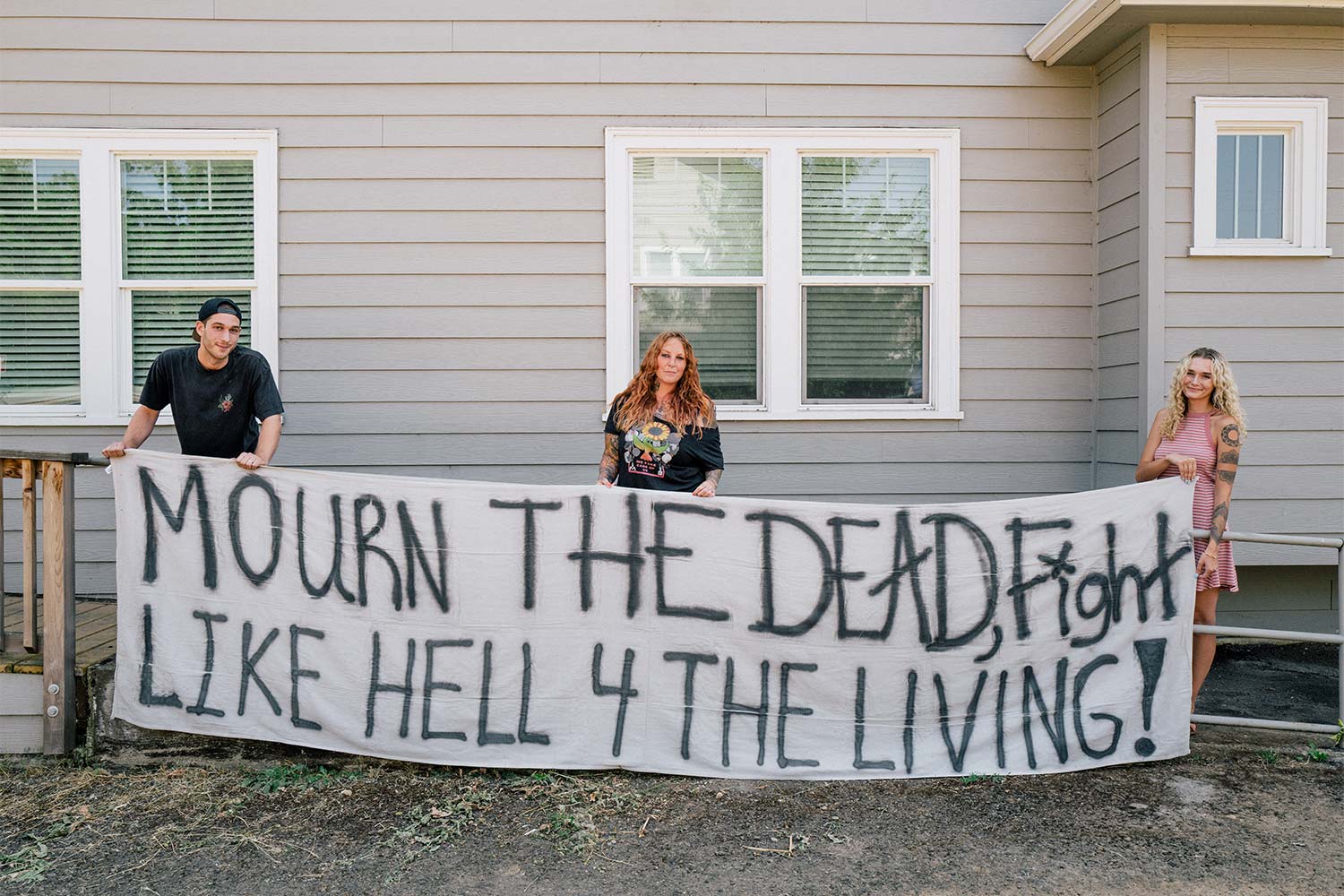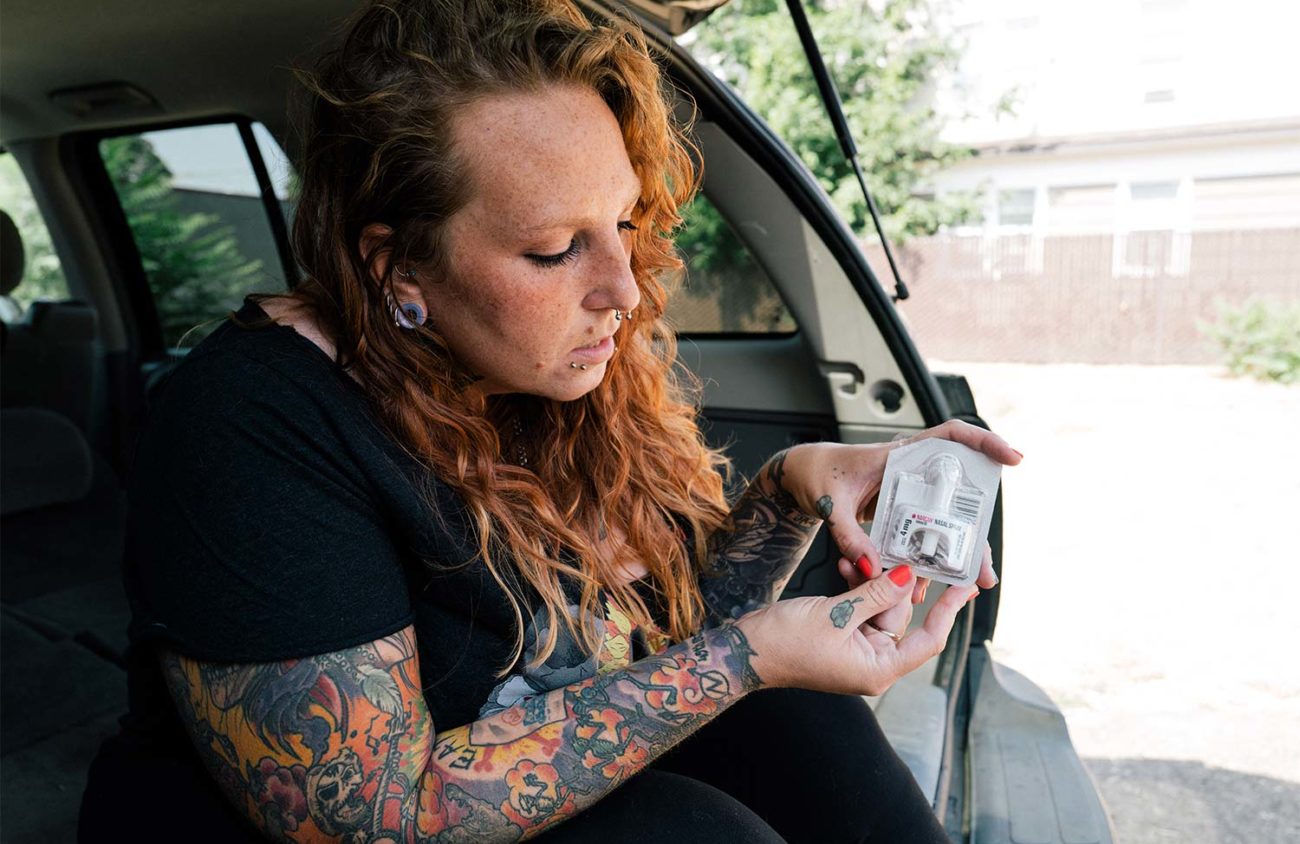Walking around Eugene you are likely to encounter bright flyers with the words “Street Feed” as well as an address, a meal, and a date and time. Many of these crazy colorful images of space cats or dog paintings are created by local artists.
These flyers advertise a biweekly program run by Community Outreach through Radical Empowerment, or CORE, where the organization cooks warm meals for young adults.
The staff of CORE may be small, but take a look at their Instagram page and you will find they are everywhere: in downtown Eugene giving out free meals or at Eugene Pride, local farmers markets and the Eugene Holiday Market handing out naloxone kits to save people from dying of a heroin overdose.
The idea behind CORE is a low-barrier social service that constantly adapts to the needs of the young adults they serve by speaking directly with them. “What CORE aims to do is look at things that we can change within social services and think outside the box,” says co-founder and co-director Brittiny Raine.
Since its small start in 2017, CORE has developed several individual programs tailored to community needs: Street Outreach Alliance Program (SOAP), Street Feed and Harm Reduction Distribution (HRD). The nonprofit also helps people with service navigation and case management.
The programs serve people between 16 and 29 years old, with the exception of Street Feed, which serves those between 16 and 24, in an attempt to provide a safe space for the younger demographic. CORE will officially open its new headquarters early next year, which will become the center of the current programs and the birthplace of many more to come.
Enlarge

Who, What, Why?
CORE was started by Raine and co-director/co-founder Dylan Weil. Before coming to Eugene, the two worked together in Seattle at a shelter for young adults. Weil says they bonded over their frustrations with the policy failures they had witnessed while working there.
Raine had firsthand experience with these kinds of failures, having gone through periods of homlessness and drug use. “I got failed miserably by the system,” Raine says. “I’m tired of watching people get failed so miserably by systems.” Eventually, she decided to pursue her long-term goal and start a nonprofit.
However, Seattle poses many challenges to small startup nonprofits. According to Raine, the city has a high number of well-funded nonprofits making it hard for new small-scale nonprofits to get a foothold.
Raine and Weil had also witnessed the gaps and shortcomings of the existing young adult social services system. They say many of them focus on qualifying for grants in order to receive funding, which can overshadow the needs of community members. “There is too much distance,” Weil says. “This person doesn’t understand [that] person’s experience.”
When it came time to start CORE, Weil and Raine knew that Seattle wasn’t the place to do it. Raine had been visiting friends in the Eugene area for a while and enjoyed the culture while also recognizing the need for more social services. As a result Eugene became CORE’s birthplace.
CORE takes a trauma-informed approach. In practice this requires building trust through transparency, humility, empowerment and collaboration. Communication is key.
CORE focuses on listening to young adults and adapting to their needs. One thing that allows them to do this is by pursuing unrestricted funding. By avoiding grants that have a laundry list of requirements, CORE’s programs can be flexible to the needs of their participants.
“Our outcomes are based on what young people identify,” Raine says. “It’s their goals,” Raine says of what young people are looking for. “Their dreams; what they want to do versus saying, ‘OK the goal has to be housing.’”
However, Eugene has its own obstacles for nonprofits focused on social services. “Oregon in general is very far behind the times,” Raine says. “We’re 20 to 30 years behind national standards within social services and service delivery.”
In Eugene this often manifests in the lack of programs focused on the specific needs of certain groups or demographics. Many organizations in Eugene are unaware that these types of programs are needed, which has at times created challenges for CORE.
Street Feed
When CORE set out to start the Street Feed program it was difficult to find a venue. “No one understood why we wanted to do a program just for young people,” Weil says. “We reached out to every church in town, library, restaurants, local governments… got turned down, turned down, turned down.”
Weil says when he and Raine first began doing outreach in Eugene and asked young adults what services they needed, they heard “safe space, free healthy food and harm reduction supplies over and over and over.” The answer was Street Feed.
Street Feed happens biweekly and provides warm meals to young people the ages of 16 to 24. The program so far has always been hosted by a local restaurant or bar and is centered around providing a warm and nutritious meal to those who need it. CORE even takes requests from participants for the next meal.
“I have a passion to cook, but have no passion around selling stuff,” Weil says. “Street Feed is where I get to go to put that love into the food, and not have to charge anybody for it.”
Having experience in the food industry, Weil has a large role in the Street Feed program, sourcing ingredients and cooking meals. In the past he hated watching restaurants try to throw out leftover food and would often sneak the leftovers out with him to give to people that needed it.
Street Feed also functions as a venue for other CORE programs like SOAP and HRD.
“A lot of people who are in that 18 to 24 year old range don’t necessarily feel comfortable going to the adult services for harm reduction supplies,” Weil says.
Enlarge

Street Outreach Alliance Program
Street Outreach, aka SOAP, was CORE Eugene’s origin. “We took out some pizza from a place that Dylan was working at and some random hygiene supplies we had and started asking young people, ‘What are you missing in your community?’” Raine says.
The program is still an essential piece of CORE that engages directly with unhoused people once a week. It offers supplies to people of all ages, but has a specific focus on people under 29.
In November, the folks of SOAP met 102 people and distributed 2,063 pieces of survival/hygiene supplies, 1,662 pieces of harm reduction supplies, 423 doses of naloxone and 310 fentanyl test strips.
CORE provides people with a wide variety of supplies from survival supplies like tents to health and harm reduction supplies like first aid kits and clean needles. As a result Street Outreach also supports CORE’s Harm Reduction Distribution or HRD.
A big part of SOAP is telling people about other CORE programs with the goal of engaging people who don’t normally access social services. SOAP also allows them to ask people what gaps they see in the Eugene social service network and work toward addressing them.
Harm Reduction
Harm reduction has been a hot topic in recent years and refers to programs that seek to provide supplies that will protect people who engage in high-risk behaviors. This includes things like handing out clean needles to drug users to avoid the spread of blood-borne illness or providing condoms to sex workers. While the subject of many conversations, harm reduction is still not a common practice in the U.S despite research from the Centers for Disease Control suggesting that syringe service programs can reduce the spread of HIV/AIDS and hepatitis C by 50 percent. According to the CDC, people that engage with a syringe program are up to five times more likely to enter drug treatment.
California Gov. Gavin Newsom vetoed a bill in August that would have implemented safe injection sites across that state. The bill would have made California the first state to embrace a practice that is already widely used across Europe and Canada. This veto by a politically left governor reinforces how controversial harm reduction continues to be in the U.S. despite years of research to the contrary.
Opponents to harm reduction claim that providing these safety supplies will only reinforce/enable high-risk behaviors, while supporters argue that people will engage in these behaviors regardless of supplies. Raine says harm reduction is about helping reduce potential harm from high-risk behaviors without an expectation of abstinence.
Because of these controversies, programs that implement harm reduction are few and far between. However, harm reduction is becoming more common in Eugene. Another local organization, HIV Alliance, has long practiced harm reduction to limit the spread of HIV. This includes needle exchange events, which the program began hosting in the Eugene and Springfield area in 1999.
What sets CORE apart from other harm reduction services is that its program prioritizes distribution to young adults, which Weil says is even rarer. The folks behind CORE make it clear that its HRD program exists because the people they serve spoke about their need for this kind of support.
“People give us a lot of credit for our Harm Reduction Distribution program, because it’s such a unique program,” Raine says. “But it’s because of young people that the program exists.”
The program has a wide reach that helps to keep people safe during a variety of risky behaviors like drug use or sex work. It works in combination with Street Feed and SOAP to make supplies like condoms, clean needles, Narcan/naloxone and others easily accessible to all their participants.
A Path to Case Management
CORE programs can be accessed individually, but are designed to work together, Raine says. SOAP, Harm Reduction Distribution services and Street Feed provide basic necessities to help keep people safe and healthy. These programs engage with participants (new and returning) and regularly get feedback from the participants who access these services.
“Those are all access points into our programs,” Raine says. “The bigger goal is getting people into programs that are beyond crisis intervention services or survival supplies, which is typically case management and life skills, because those are where we see the real impact.”
Raine says this is all part of what she calls the bridge model, which CORE adopted from colleagues in the social work industry. She says it recognizes that people are sometimes pushed toward case management or higher level services without being provided simple needs like food and shelter. Without the security and stability of these basic needs it makes it hard for participants to focus on longer term goals.
To address this CORE provides basic needs programs that function as a bridge to these longer term services like service navigation and case management. Following this model, CORE provides for the basic needs of participants but also tries to engage them in other programs that can help people toward individual goals.
Service navigation is when CORE meets directly with participants and helps them to identify personal needs and goals. Unlike many case management programs, CORE’s service navigation is not focused solely on housing and instead is more open ended.
“We don’t refer people to case management if it’s not appropriate,” Raine says. “We’ve had young people that come in and just need some food.” She says that if someone really needs a resource or resources, then, “just sitting with them there and helping them through it, that really changes their trajectory.”
The program meets with participants directly and helps them pursue a chosen goal. In addition to things like housing and education, service navigation helps people with tribal enrollment, public benefit enrollment, rent support, relocation and a variety of other options depending on the needs of participants.
“We’ve set it up this way where it’s putting young people in the center,” Raine says. “[We] say, ‘You’re the expert in this, what do you want to work on?’”
CORE HQ
CORE will open its new headquarters to the public in April 2023. The new building, which will become the center of all these programs, is located at 692 Jefferson Street, across the street from Washington Jefferson Park, placing CORE just inside the east side of the Whiteaker. The building gives them a central location between downtown and west Eugene and is right off of 6th Avenue, making it accessible and easily recognizable.
The folks at CORE describe their new house as an opportunity for the organization to build generational wealth and have a home that can advocate for and normalize the values that they practice like harm reduction, and radical empowerment.
The CORE headquarters will not only host current programs, but will allow it to begin implementing new programs that participants request, Raine says. With the new building, things like community classes, workshops and support groups can offer more engagement and support to young adults.
For those looking to donate to CORE’s new facility or any of the other programs, you can donate through CORE’s website, which also offers contact information for those seeking support. CORE will be at the Eugene Holiday Market Dec. 10 and 11 at the Lane Events Center, handing out stickers, naloxone and what they call car packs, which include warm socks, hot warmers and emergency blankets.
“I know that there’s a lot of fatigue around talking about homelessness,” Raine says. “But I have hope that this house can be the center of that and how we actually start to have those community conversations with people around young adult homelessness.”
To find out more about CORE, get help or donate to its work, go to COREEugene.org, email info@coreeugene.org. Find CORE on Instagram @Core.eugene or Facebook.com/coreeugene. As of April 2023 find CORE at 692 Jefferson Street in Eugene.
A Note From the Publisher

Dear Readers,
The last two years have been some of the hardest in Eugene Weekly’s 43 years. There were moments when keeping the paper alive felt uncertain. And yet, here we are — still publishing, still investigating, still showing up every week.
That’s because of you!
Not just because of financial support (though that matters enormously), but because of the emails, notes, conversations, encouragement and ideas you shared along the way. You reminded us why this paper exists and who it’s for.
Listening to readers has always been at the heart of Eugene Weekly. This year, that meant launching our popular weekly Activist Alert column, after many of you told us there was no single, reliable place to find information about rallies, meetings and ways to get involved. You asked. We responded.
We’ve also continued to deepen the coverage that sets Eugene Weekly apart, including our in-depth reporting on local real estate development through Bricks & Mortar — digging into what’s being built, who’s behind it and how those decisions shape our community.
And, of course, we’ve continued to bring you the stories and features many of you depend on: investigations and local government reporting, arts and culture coverage, sudoku and crossword puzzles, Savage Love, and our extensive community events calendar. We feature award-winning stories by University of Oregon student reporters getting real world journalism experience. All free. In print and online.
None of this happens by accident. It happens because readers step up and say: this matters.
As we head into a new year, please consider supporting Eugene Weekly if you’re able. Every dollar helps keep us digging, questioning, celebrating — and yes, occasionally annoying exactly the right people. We consider that a public service.
Thank you for standing with us!

Publisher
Eugene Weekly
P.S. If you’d like to talk about supporting EW, I’d love to hear from you!
jody@eugeneweekly.com
(541) 484-0519
